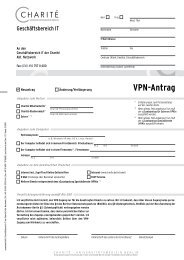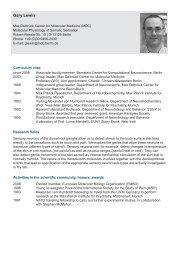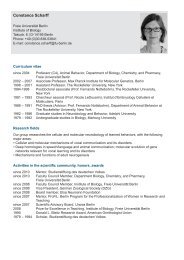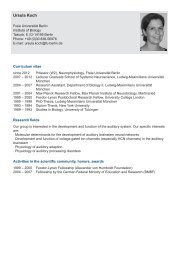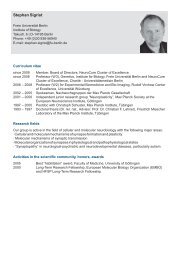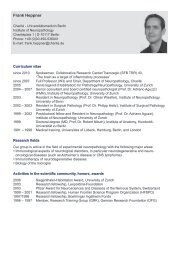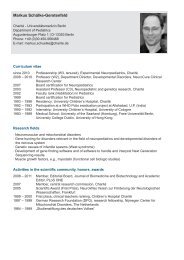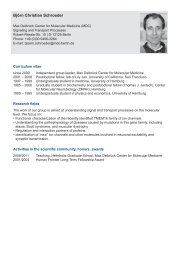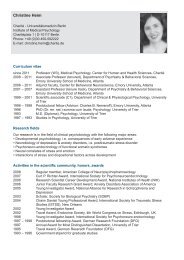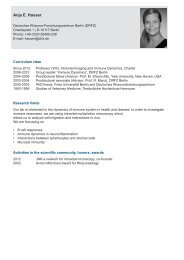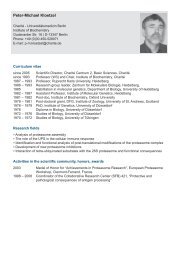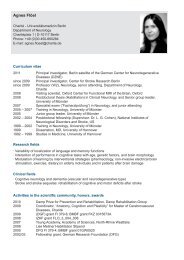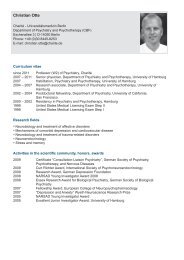Sarah Shoichet - NeuroCure
Sarah Shoichet - NeuroCure
Sarah Shoichet - NeuroCure
Create successful ePaper yourself
Turn your PDF publications into a flip-book with our unique Google optimized e-Paper software.
<strong>Sarah</strong> <strong>Shoichet</strong><br />
Charité - Universitätsmedizin Berlin<br />
Neuroscience Research Center (NWFZ)<br />
Charitéplatz 1 | D-10117 Berlin<br />
Phone: +49 (0)30 450-539099<br />
E-mail: sarah.shoichet@charite.de<br />
Curriculum vitae<br />
2010 Professor (W2), Molecular Neurobiology and Genetics, Charité<br />
2008 – 2009 Rahel-Hirsch postdoctoral fellow, Neuroscience Research Center, Charité<br />
2000 – 2007 Doctoral studies and junior postdoc (including maternity leave and part-time<br />
research activity in 2006/2007), Department Neurogenetics (Prof. H.H. Ropers),<br />
Max Planck Institute for Molecular Genetics Berlin<br />
1998 – 2000 Research assistant, Dana Farber Cancer Institute, Boston<br />
1998 – 1999 Part-time studies, Cellular & Molecular Biology, Genetics Harvard Extension School,<br />
Cambridge, Massachusetts<br />
1996 – 1997 Research assistant, NeuroVir Inc. (startup biotech company), Vancouver<br />
1992 – 1995 B.Sc. Physics, Upper Second Class, Queen’s University, Kingston, Canada<br />
Research fields<br />
Our group is active in the field of molecular neurobiology and genetics with primary interests in:<br />
n Molecular mechanisms underlying neurodevelopmental disorders such as autism, intellectual<br />
disability, and epilepsy<br />
n Post-translational modifications of neuronal proteins and subsequent effects on neuron development<br />
and function<br />
Activities in the scientific community, honors, awards<br />
2011 Board member, Admissions and Examination Committee, International Graduate<br />
Program Medical Neurosciences, Charité<br />
2011 Selected participant, Charité Mentoring Program<br />
2009 Selected participant, Roche-Nature Medicine Translational Neuroscience Symposium<br />
2009: Autism and Other Developmental Brain Disorders (Switzerland)<br />
2008 Rahel-Hirsch Stipend, Charité, ranked first among successful applicants<br />
2005 PhD Thesis Awards: Berlin Academic Society Thesis Award (Berliner<br />
Wissenschaftliche Gesellschaft Promotionspreis), Otto Hahn Medal, Max Planck<br />
Society<br />
2003 Conference Award “Best Presented Scientific Work” International Workshop on Fragile<br />
X Syndrome and XLMR<br />
1992 Canada Scholarship for Scientists and Engineers<br />
Queen’s University Entrance Scholarship
Selected publications<br />
Lesch, KP, Selch, S, Renner, TJ, Jacob, C, Nguyen, TT, Hahn, T, Romanos, M, Walitza, S, <strong>Shoichet</strong>,<br />
S, Dempfle, A, Heine, M, Boreatti-Hummer, A, Romanos, J, Gross-Lesch, S, Zerlaut, H, Wultsch, T,<br />
Heinzel, S, Fassnacht, M, Fallgatter, A, Allolio, B, Schafer, H, Warnke, A, Reif, A, Ropers, HH and<br />
Ullmann, R. Genome-wide copy number variation analysis in attention-deficit/hyperactivity disorder:<br />
association with neuropeptide Y gene dosage in an extended pedigree. Mol Psychiatry. 2011; 16, 491-<br />
503.<br />
<strong>Shoichet</strong>, SA*, Waibel, S*, Endruhn, S, Sperfeld, AD, Vorwerk, B, Muller, I, Erdogan, F, Ludolph,<br />
AC, Ropers, HH and Ullmann, R. Identification of candidate genes for sporadic amyotrophic lateral<br />
sclerosis by array comparative genomic hybridization. Amyotroph Lateral Scler. 2009; 10, 162-9.<br />
| * equal contribution<br />
Kalscheuer, VM, FitzPatrick, D, Tommerup, N, Bugge, M, Niebuhr, E, Neumann, LM, Tzschach, A,<br />
<strong>Shoichet</strong>, SA, Menzel, C, Erdogan, F, Arkesteijn, G, Ropers, HH and Ullmann, R. Mutations in autism<br />
susceptibility candidate 2 (AUTS2) in patients with mental retardation. Hum Genet. 2007; 121, 501-9.<br />
<strong>Shoichet</strong>, SA, Duprez, L, Hagens, O, Waetzig, V, Menzel, C, Herdegen, T, Schweiger, S, Dan, B, Vamos,<br />
E, Ropers, HH and Kalscheuer, VM. Truncation of the CNS-expressed JNK3 in a patient with a severe<br />
developmental epileptic encephalopathy. Hum Genet. 2006; 118, 559-67.<br />
<strong>Shoichet</strong>, SA, Kunde, SA, Viertel, P, Schell-Apacik, C, von Voss, H, Tommerup, N, Ropers, HH<br />
and Kalscheuer, VM. Haploinsufficiency of novel FOXG1B variants in a patient with severe mental<br />
retardation, brain malformations and microcephaly. Hum Genet. 2005; 117, 536-44.<br />
<strong>Shoichet</strong>, SA, Hoffmann, K, Menzel, C, Trautmann, U, Moser, B, Hoeltzenbein, M, Echenne, B, Partington,<br />
M, Van Bokhoven, H, Moraine, C, Fryns, JP, Chelly, J, Rott, HD, Ropers, HH and Kalscheuer, VM.<br />
Mutations in the ZNF41 gene are associated with cognitive deficits: identification of a new candidate for<br />
X-linked mental retardation. Am J Hum Genet. 2003; 73, 1341-54.<br />
Kalscheuer, VM, Freude, K, Musante, L, Jensen, LR, Yntema, HG, Gecz, J, Sefiani, A, Hoffmann, K,<br />
Moser, B, Haas, S, Gurok, U, Haesler, S, Aranda, B, Nshedjan, A, Tzschach, A, Hartmann, N, Roloff, TC,<br />
<strong>Shoichet</strong>, S, Hagens, O, Tao, J, Van Bokhoven, H, Turner, G, Chelly, J, Moraine, C, Fryns, JP, Nuber,<br />
U, Hoeltzenbein, M, Scharff, C, Scherthan, H, Lenzner, S, Hamel, BC, Schweiger, S and Ropers, HH.<br />
Mutations in the polyglutamine binding protein 1 gene cause X-linked mental retardation. Nat Genet.<br />
2003; 35, 313-5.<br />
<strong>Shoichet</strong>, SA, Baumer, AT, Stamenkovic, D, Sauer, H, Pfeiffer, AF, Kahn, CR, Muller-Wieland, D,<br />
Richter, C and Ristow, M. Frataxin promotes antioxidant defense in a thiol-dependent manner resulting<br />
in diminished malignant transformation in vitro. Hum Mol Genet. 2002; 11, 815-21.<br />
Malik, TH, <strong>Shoichet</strong>, SA, Latham, P, Kroll, TG, Peters, LL and Shivdasani, RA. Transcriptional repression<br />
and developmental functions of the atypical vertebrate GATA protein TRPS1. EMBO J. 2001; 20, 1715-<br />
25.<br />
<strong>Shoichet</strong>, SA, Malik, TH, Rothman, JH and Shivdasani, RA. Action of the Caenorhabditis elegans<br />
GATA factor END-1 in Xenopus suggests that similar mechanisms initiate endoderm development in<br />
ecdysozoa and vertebrates. Proc Natl Acad Sci U S A. 2000; 97, 4076-81.



